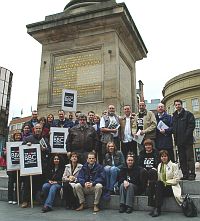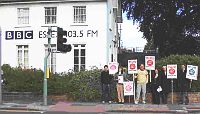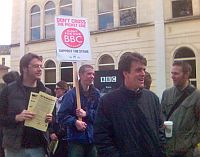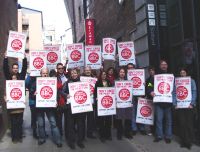Unions wait for BBC's next move

Members protest at Newcastle.
Figures provided by union stewards across the UK indicate that more than 13,000 staff supported the 24-hour stoppage which was called in protest at plans for widespread cuts and privatisation at the BBC.
Although few screens went blank as a result of the strike, many programmes and services continued on air only by use of pre-recorded and library material, and the unions estimated that up to 95% of production had been affected.
A further two days of strike action are scheduled for May 31, and June 1, however union negotiators emphasised throughout the first stoppage that they would be willing to return to talks with the BBC, provided they represented full negotiations on Mark Thompson's plans, and not a supine process of consultation.

The scene at BBC Essex during the day.
Union estimates from local representatives told a different story, revealing that in almost all areas a high proportion of staff had stayed away from work.
For example, in Glasgow, said the unions, only 40 staff had worked out of 1,400 in total, reflecting a similarly high turnout in Belfast while in Birmingham only 70 of the 730-strong workforce crossed the picket line.

Bristol members make their views known.
Support for the strike in some smaller centres, like Hull, Edinburgh, Aberdeen, and Bangor, was so high that stewards described members as being "all out" for practical purposes.
A significant proportion of members supporting the stoppage had never taken strike action before, and more experienced union representatives expressed admiration for their willingness to join in, and the enthusiasm that many of them brought to picket lines.
For several buildings, picketing was more resolved than for many years, with an all-night presence at a number of centres, and attendance running into several hundred at larger buildings, including Television Centre in London, where figures from BECTU, NUJ, and Amicus, joined veteran politician Tony Benn in raising the spirits of striking members at a rally.

Members display union posters at Edinburgh.
Prior to the day of action, unions reported a surge of new members joining, and BECTU alone has signed up more than 1,200 new joiners since the first announcement of cuts in December, almost 300 of them in the last ten days.
Management claims that staff had joined only because of intimidation from existing members were laughed off by the unions, who pointed to the good-natured and disciplined atmosphere on all picket lines.
Officials said that the outcome of the strike vindicated their view that BBC staff generally were sceptical, angry, and in many cases frightened by Thompson's plans.
